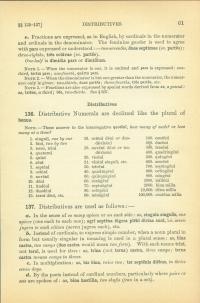136. Distributive Numerals are declined like the plural of bonus.
Note— These answer the interrogative quotēnī (how many of each? or how many at a time?).
| 1. singulī one by one | 18. octōnī dēnī or duodēvīcēnī |
300. trecēnī |
| 2. bīnī two by two | 19. novēnī dēnī or ūndēvīcēnī |
400. quadringēnī |
| 3. ternī, trīnī | 20. vīcēnī | 500. quīngēnī |
| 4. quaternī | 21. vīcēnī singulī, etc. | 600. sescēnī |
| 5. quīnī | 30. trīcēnī | 700. septingēnī |
| 6. sēnī | 40. quadrāgēnī | 800. octingēnī |
| 7. septēnī | 50. quīnquāgēnī | 900. nōngēnī |
| 8. octōnī | 60. sexāgēnī | 1000. mīllēnī |
| 9. novēnī | 70. septuāgēnī | 2000. bīna mīlia |
| 10. dēnī | 80. octōgēnī | 10,000. dēna mīlia |
| 11. ūndēnī | 90. nōnāgēnī | 100,000. centēna mīlia |
| 12. duodēnī | 100. centēnī | etc. |
| 13. ternī dēnī, etc. | 200. ducēnī |
137. Distributives are used as follows:
a. In the sense of so many apiece or on each side.
singula singulīs one apiece (one each to each one)
agrī septēna iūgera plēbī dīvīsa sunt i.e. seven jugera to each citizen (seven jugera each), etc.
b. Instead of cardinals, to express simple number, when a noun plural in form but usually singular in meaning is used in a plural sense.
bīna castra two camps1
With such nouns trīnī, not ternī, is used for three.
trīna castra2 three camps
c. In multiplication.
bis bīna twice two
ter septēnīs diēbus in thrice seven days
d. By the poets instead of cardinal numbers, particularly where pairs or sets are spoken of.
bīna hastīlia two shafts (two in a set)

